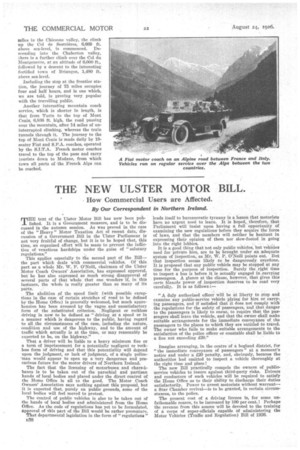THE NEW ULSTER MOTOR BILL.
Page 56

If you've noticed an error in this article please click here to report it so we can fix it.
How Commercial Users are Affected.
By Our Correspondent in Northern Ireland.
rillTFI text of the Ulster Motor Bill has now been pub lished. It is a Government measure, and is to be diecussed in the autumn session. As was proved in the case of the "Heavy" Motor Taxation Act of recent date, discussion of a Government Bill in the Ulster Parliament is not very fruitful of change, but it is to be hoped that, this time, an organized effort will be mane to prevent the infliction of vexatious hardships under the guise of "salutary regulations."
This applies especially to the second part of the Bill— the part which deals with commercial vehicles. Of this part as a whole Mr. W. P. O'Neill, chairman of the Ulster Motor Coach Owners' Association, has expressed approval, but he has also expressed so much strong disapproval of several parts of that whole that one wonders if, in this instance, the whole is really greater than so many of its parts.
The abolition of the speed limit (with possible exceptions in the case of certain stretches of road to be defined by the Home Office) is generally welcomed, but much apprehension has been aroused by the vague and unsatisfactory form of the substituted criterion. Negligent or reckless driving is now to be defined as "driving at a speed or in a manner which is dangerous to the public, having regard to all the circumstances of the case, including the nature, condition and use of the highway, and to the amount of traffic which actually is at the time, or may reasonably be expected to be, on the highway."
That a driver will be liable to a heavy minimum fine or a term of imprisonment for a potentially negligent or reckless form Of driving and that this potentiality will depend upon the judgment, or lack of judgment, of a single policeman would appear to open up a very dangerous and precarious future for the motor drivers of Northern Ireland.
The fact that the licensing of motorbuses and chars-ilbanes is to be taken out of the parochial and partisan hands of local bodies and placed under the direct control of the Home Office is all to the good. The Motor Coach Owners' Association says nothing against this proposal, but it is expected that, purely on public grounds, some of the local bodies will feel moved to protest.
The control of public vehicles is also to be taken out of the hands of local bodies and administered from the Hanle Office. As the code of regulations has yet to be formulated, approval of this part of the Bill would be rather premature. That departmental legislation in the form of " regulations " B38 lends itself to bureaucratic tyranny is a lesson that motorists have no urgent need to learn. It is hoped, :therefore, that Parliament will insist upon having a full opportunity of examining the new regulations before they acquire the force of laws, and that the members will neither be hesitant in expressing their opinion of them nor slow-footed in going into the right lobbies.
It is a good thing that not only public vehicles, but vehicles used for private hire, are to be brought under an adequate s3rstem of inspection, as Mr. W. P. O'Neill points out. But that inspection seems likely to be dangerously, overdone. It is proposed that any public vehicle may be stopped at any time for the purpose of inspection. Surely the ,right time to inspect a bus is before it is actually engaged in carrying passengers. A glance at the clause, however, that gives this carte blanche power of inspection deserves to be read very carefully. It is as follows:—
" A duly authorized officer will be it liberty to stop and examine any public-service vehicle plying for hire or carrying passengers, and if satisfied that it does not comply with the regulations for the safety of passengers, and that danger to the passengers is likely to ensue, to require that the passengers shall leave the vehicle, and that the owner shall make suitable arrangements for the immediate conveyance of he passengers to the places to which they are entitled to travel. The owner who fails to make suitable arrangements to the satisfaction of the police officer or constable shall be liable to a fine not exceeding £20."
Imagine arranging, in the centre of a bogland district, for "the immediate conveyance of passengers" at a moment's notice and under a 120 penalty, and, obviously, because the authorities had omitted to inspect a vehicle thoroughly at the right time and place!
The new Bill practically compels the owners of publicservice vehicles to insure against third-party risks. Drivers and conductors of such vehicles will be required to satisfy the Home Office as to their ability to discharge their duties satisfactorily. Power to arrest motorists without warrant— a Star Chamber revival—is to be granted, in certain circumstances, to the police.
The present cost of a driving licence is, for some tuifathomable reason, to be increased by 100 per cent.! Perhaps the revenue from this source will be devoted to the training of a corps of super-officials capable af administering the Motor Vehicles (Traffic and Regulation) Bill of 1926.




































































































